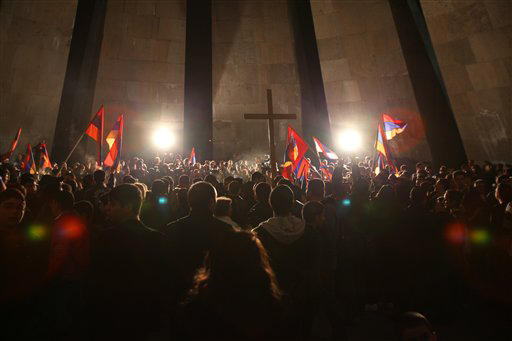
By Katherine Sadaniantz
There is no beauty in death. A human’s death is not just a catalyst for hurt, but hurt itself. There is no beauty in death.
However, there are economic and political rewards in death. One person’s death may entail another’s gain: of land, capital or social status. In the early 1900s, The Young Turks, the agents of the Armenian Genocide, sought these rewards via the 1.5 million deaths of the Armenians. As a result of the genocide, Armenia lost 85 percent of its historical territory, and the Armenians no longer seemed to pose a threat to the Ottoman Empire. The small but vibrant Christian nation was seemingly subdued by the sprawling hand of an undeniably violent imperialism operating under the banner of Islam.
In the face of such paralyzing statistics and countless tales of elaborately organized inhumanity, why has Turkey not admitted to the systematic killing of Armenians, instead naming these deeds and deaths the results of war? This is because Turkey has too much to lose — land, wealth and the already-unsteady reputation they maintain in the global political world. And why has America, the self-delegated force of democracy and freedom, not recognized this genocide? It is because the government believes it cannot afford to jeopardize its relationship with the government of Turkey, a powerful ally. In the face of military or monetary negotiations of power, it finds itself unable to recognize the victims the way they deserve.
There is no beauty in death. Armenians have been systematically oppressed for a hundred years through the denial of a part of history too weighty for any single man, nation or diaspora to grieve alone. In turn, this denial has conveniently eased the way toward numerous genocides across a variety of peoples and cultures.
For those still enabled by rights of free speech and action, there is the potential to, if not erase these deaths, honor the lives that preceded them; to deny Adolf Hitler’s cry, “Who, after all, speaks today of the annihilation of the Armenians?” There is the potential to deny the notion that economic and political benefits supersede humane actions; to deny the casualness that a term like “war casualties” implies, to deny the careless romanticization of death — to remember that death is crippling, deafening, and starkly silent.
There is no beauty in death: of a person, of a people, of principles or peace. But there is beauty in life. Before returning to school from Easter break, I skipped rocks with my father at the edge of the ocean and my father told me of his own teacher: a family friend from Paris, who returned to his homeland after years of exile, and stood at the edge of his native waters to waste time like he did in his boyhood — that is, before those affiliated with the Young Turks executed his parents and seized his home. In the face of certain death, this man lost his innocence, but retained his life.
Despite his first-hand account of witnessing death, and the pain of the decades of denial that followed, he continued to live. In teaching my father to skip stones, he taught my father that there are two parts to survival, and that the latter is the greater: an avoidance of death, and then a courageously continued life. Now across the generations, it is through his life that, on that spring day, I experienced the world’s beauty.
So on this 100th anniversary of the Armenian Genocide, do not forget the far too many deaths of the far too innocent. Do not forget the deaths, but remember the Armenians. Remember the Armenians as persons so eagerly filling your place at the table with dolmas and bureks before dinner has even started. Remember the Armenians as persons who wrote poetry as Saroyan did, or revolutionized the orchestra as Khachaturian did, or who continue to inspire the imagination through film as Egoyan does.
Remember the Armenians, as persons who — at the very whisper of their native music — clasp pinkies and begin to dance until they gasp for breath amid boisterous words and roaring laughter. Remember the Armenians in death, but remember them in life — as persons who still have so much to give to the world. Listen to them; mourn with them and skip rocks with them. Set them free.









































































































































































































